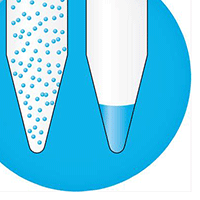The Lenti-X p24 Rapid Titer Kit uses a standard ELISA to quickly determine the titer of any HIV-1-based lentiviral supernatant. The wells of the included microtiter plate (12 x 8-well strips) are coated with anti-p24 capture antibody, which quantitatively binds the p24 virus core/capsid protein in your test samples. Specifically bound p24 is detected in a typical sandwich ELISA format using a biotinylated anti-p24 secondary antibody, a streptavidin-HRP conjugate, and a color-producing substrate. A p24 standard curve quantifies p24 content, which allows the lentivirus titer to be calculated.

Figure 1. The Lenti-X p24 Rapid Titer Kit protocol. Lentiviral p24 in your packaging cell supernatant is bound to anti-p24-coated wells and detected using a combination of biotinylated anti-p24 secondary antibody, streptavidin-HRP, and a color reagent.







